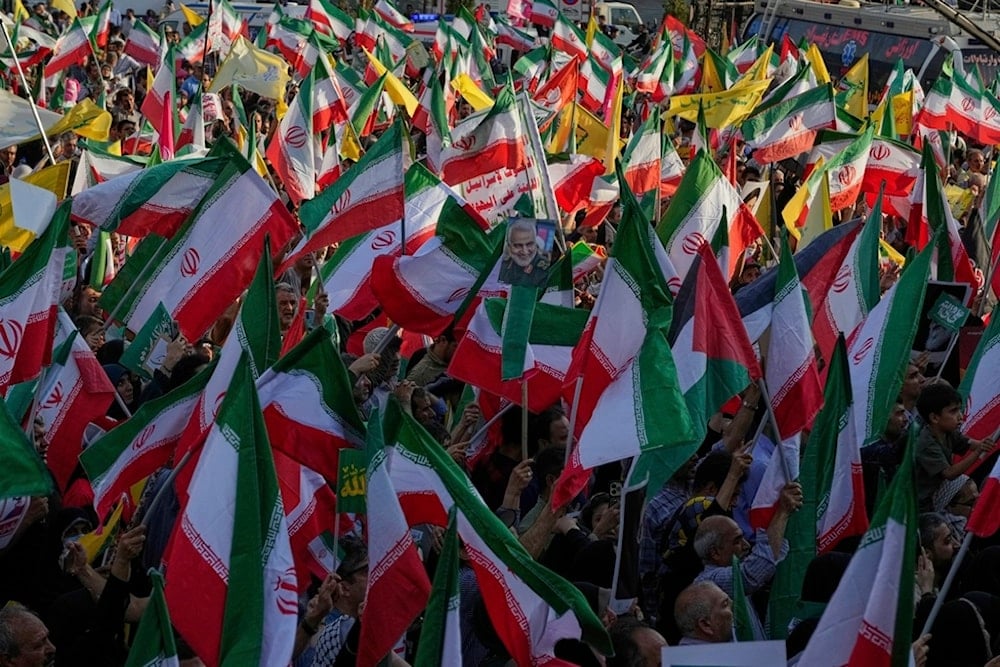Iran vows to continue enriching uranium, says talks need US guarantees
Iran confirms ongoing uranium enrichment and says future nuclear talks depend on US guarantees to avoid military threats during negotiations.
-

Demonstrators wave Iranian and Hezbollah flags in Tehran, Iran, Saturday, June 14, 2025. (AP)
Iranian Deputy Foreign Minister Majid Takht-Ravanchi confirmed on Thursday that the Islamic Republic will continue enriching uranium in line with its national needs, signaling that Tehran remains firm in its nuclear program despite the US-Israeli strikes that targeted its nuclear sites.
“Iran is not planning further responses to the United States following the attacks on its nuclear program, unless Washington takes further aggressive action,” Takht-Ravanchi stated.
He emphasized that Iran remains open to dialogue but conditioned future negotiations on credible US guarantees. “The United States must convince us that it will not resort to military force during negotiations. This is a fundamental prerequisite for our leadership to decide on the next round of talks,” he added.
US misled Iran, harmed its people
Questioning Washington's reliability, the Iranian diplomat asked, “How can we trust the Americans?” He reiterated Tehran’s view that the US had misled Iran and imposed severe harm on its people through its actions, which Iran considers catastrophic.
Meanwhile, senior Iranian lawmaker and member of the National Security Committee, Alaeddin Boroujerdi, echoed the government’s stance, affirming that Iran “will continue enrichment at any level required by national interests.”
In a related development, International Atomic Energy Agency (IAEA) Director Rafael Grossi acknowledged Iran’s continued nuclear progress, stating that “nuclear knowledge in Iran cannot be erased and its capabilities cannot be undone.”
The aftermath of attacking Iran's nuclear facilities
Iran’s parliament passed a bill to suspend cooperation with the International Atomic Energy Agency just days after the strikes on its nuclear facilities. One Iranian lawmaker stated, “Why was our nuclear facility attacked, and you remained silent? Why did you give the green light for these actions?”
As Toossi warns, by attacking nuclear sites while demanding oversight, the US and “Israel” may have inadvertently legitimized the pursuit of a nuclear deterrent.
Foreign Policy argues that its ballistic arsenal successfully pierced both Israeli and US air defenses, targeting refineries, military bases, and research centers. Though censorship in “Israel” limited public data, over 41,000 compensation claims were reportedly filed due to war damage. Meanwhile, “Israel” expended an estimated $500 million worth of US-supplied THAAD missile interceptors.
A ceasefire was necessary to 'save Israel'
Economic disruption was also severe. Ben Gurion Airport was shut down, financial activity slowed, and capital outflows surged. Former Trump advisor Steve Bannon bluntly stated that the ceasefire was necessary to “save Israel,” while Donald Trump admitted that “Israel” had been hit “very hard.”
In a revealing statement, Trump also announced that China would be permitted to buy Iranian oil to help Iran “get back into shape.”
That said, Toossi highlights how Iran’s retaliatory strategy was calibrated and symbolic. After an Israeli drone strike on an Iranian refinery, Iran responded by hitting a refinery in Haifa. After "Israel" attacked suspected nuclear research centers, Iran struck the Weizmann Institute of Science near Tel Aviv, long believed to be part of “Israel’s” nuclear research apparatus. These strikes demonstrated Tehran’s capacity for restrained but potent retaliation.
On the domestic front, instead of sparking internal collapse, the war triggered a surge of national unity across Iran. As Toossi observes, the strikes unified a polarized society in resistance to foreign aggression. Civil society, from Gen Z activists to artists and athletes, mobilized in solidarity. Citizens opened their homes to the displaced, and the indiscriminate loss of civilian life only deepened collective resilience.

 4 Min Read
4 Min Read










